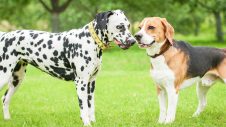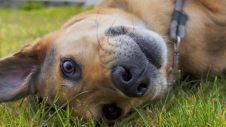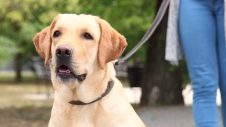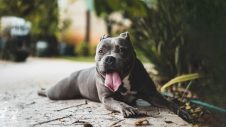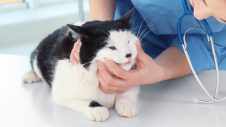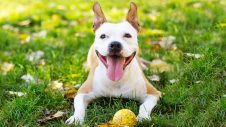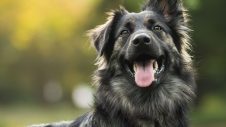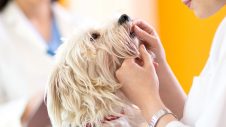Caring for an old friend
An old pet is an old friend. When your loyal friend begins to slow down, make their life comfortable and as full of love as ever.
When is my pet old?
The average lifespan of a dog is 12 years, and 14 years for a cat. Usually, the larger the animal, the shorter the lifespan. We consider a dog or cat an older or ‘geriatric’ pet at the age of seven years. The rate of ageing can differ slightly between different breeds and sizes of pets.
Effects of ageing
As your pet ages, two kinds of changes occur. The first is age-related changes, such as hearing loss, changes in vision, or reduced activity. These are normal and cannot be prevented. The second kind is pathological changes or diseases, such as heart disease, kidney disease, or dental disease. These are, to some extent, preventable or can be successfully managed.
Healthcare for your pet
The healthcare your pet receives throughout their lifetime can help minimise and prevent disease as it develops. Proper healthcare includes periodic examinations by your veterinarian, routine vaccinations, parasite control, regular exercise, dental care, and a diet that meets your pet’s changing nutritional needs.
The older cat’s healthcare needs
- Vaccinations – yearly vaccination to prevent Feline Respiratory Disease (cat flu) and enteritis.
- Parasite control – regular worming for gastrointestinal worms (every three months in adult cats), heartworm preventative medication and flea control all year round.
- Proper nutrition – older cats are more sensitive to nutrient imbalances. Administer a balanced diet with levels of nutrients that avoid the harmful effects of excessive sodium, phosphorous, calcium, and magnesium. If obesity or a tendency to put on weight is a problem, use a lower-energy, high-fibre diet.
- Exercise – to maintain muscle tone, enhance circulation, and help prevent obesity (adjust to ability). Playtime is an excellent form of exercise.
- Dental care – yearly cleaning and dental care greatly assist in maintaining oral health and preventing tooth loss, tartar, periodontal disease, and mouth odours common in older cats.
- Regular veterinary care – twice yearly examinations for early detection of disease are advised.
- Preventative testing – wellness screenings such as blood tests, urinalysis, faecal analysis, heartworm and FIV testing are all important for detecting underlying health issues.
In addition to these health care recommendations, the most important thing you can do for your old friend is pay them attention. Your observation can catch many potential difficulties before they become life-threatening. When you take your pet to the veterinarian, you can give the doctor details that may indicate a problem. The vet doesn’t see your old friend eating, playing or resting every day.
If appropriate, bring in a fresh sample of faeces and/or urine with you to te vet. It is important that you notice any changes in eating habits, activity, sleep or elimination, and communicate them to your veterinarian.
Diet recommendations
Dogs and cats experience significant changes in their ability to digest and absorb nutrients as they age. A proper diet can have a significant impact on your older pet’s overall health. Appropriate food for your senior pet should be chosen with the help of your veterinarian. A wide range of special diets are available, like Hills Science and Royal Canin diets. Unless advised otherwise by your veterinarian, gradually introduce any new diet over a 5 to 10-day period. Mix the new diet with your pet’s current food, gradually increasing its proportion until the changeover has been completed.
Signs of heart failure
Coughing is often one of the first signs of heart problems. Reduced exercise tolerance and a swollen abdomen may also be seen with heart disease. A lot of dogs have ongoing heart problems and murmurs throughout their lives which should be closely monitored, particularly in older age. Improving an animal’s heart function can dramatically alter the quality of your pet’s life. Heartworm prevention throughout life is necessary for both cats and dogs.
Arthritis
All animals will develop a degree of arthritic change as the years go by, particularly in large breeds and overweight animals. The basic needs for an older pet’s musculoskeletal system are:
- The warmest, softest bedding, particularly in winter (e.g. mattresses, trampoline beds, blankets).
- Keeping your pet’s weight stable or start weight reduction if overweight.
- Keeping up your pet’s exercise regime without being excessive – lying around all day does not do any good for mobility.
If these measures are taken and discomfort persists, discuss the best course of action to make your older pet more comfortable with your vet.
Bad breath
Bad odour from your pet’s mouth will usually indicate poor dental health. You can help prevent this with regular tooth brushing, but regular dental checks are the best way to detect problems early and maintain mouth health.
Cloudy eyes
The most common old age eye problems are cataracts. These decrease your pet’s sight and particularly their night vision. These changes are generally irreversible and progressive and appear as a milky change in the pupils. Where vision is seriously compromised, surgery will be beneficial and will require referral to a specialist. Cloudy eyes can, however, indicate other ocular problems and should always be checked by your veterinarian.
Weight loss
Loss of general body condition is worrying at any time. In older animals, a change in diet may be the solution. Pet’s nutritional demands change as they age, so adjusting their diet to suit their needs will ensure their best health.
Lumps and bumps
As the years go by, your pet may develop lumps, which should be checked by your veterinarian. Many are harmless and to be expected with advancing age. Causes for concern include the lump growing or changing in shape rapidly, your pet chewing or scratching at a lump, or if the lump is in a compromising position like the eye, anus, or armpits. In most cases, only microscopic examination can reveal the type and nature of your pet’s lumps.
Drinking excessively
Excessive drinking is usually associated with increased urination and can be an indicator of many disease conditions. Kidney failure, diabetes, and hyperthyroidism are common conditions in elderly cats and often cause weight loss. These problems need early detection and treatment. A urine sample and or blood test is essential.
Long toenails
As an animal’s exercise vigour decreases, less wear to toenails can become a problem. This can cause lameness, disfigurement or ingrown toenails. Nails should be regularly trimmed (a small amount at a time to avoid injury). In many cases, you may need to bring your pet to the vet for a nail trim.
What exercise is safe for my senior pet?
As with humans, as your pet ages, they will become slower and stiffer. Dr Helen Harvey, a veterinary surgeon at Greencross Vets Wishart Road, says, “We recommend a small amount of frequent low-impact exercise. Walking is great for your senior pet and will help keep them mobile and free of pain. Generally, walking on a leash is best as it limits dogs from running around like crazy before realising they have aches and pains from doing so.”
Similarly, cats benefit from regular playtime to keep active.
How often and how much should I exercise my pet?
A short walk every day is ideal; however, “Your pup will benefit from three 20-minute walks a week. This is better than one long walk as it will prevent your pet from tiring out and over-using sore joints”, says Dr Harvey.
What are some signs I’m under or over-exercising my dog?
Dr Harvey says, “The most obvious sign your pet isn’t moving enough is weight gain.” Consider an extra walk or playtime to help shift weight. Also consider talking to your local Greencross Vets clinic to review the type of food and amount of calories you’re feeding them.
“If you’re worried you’re over-exercising your elderly dog, watch for tell-tale signs like sitting down mid-walk and refusing to go any further, becoming lame, limping or acting in pain or distress.”
The same goes for your beloved feline. If they don’t want to play any more they may be tired out. Let your pet guide you for frequency and duration.
What conditions stop senior pets from being able to exercise?
“While there is very little that will stop your pooch from running around, if they suffer from arthritis or heart conditions, it is advisable to scale back on exercise,” says Dr Harvey. Arthritis is inflammation of the joints and can be very painful for your pet. If your elderly dog or cat is showing signs of pain, stop playing and let them rest.
Your pet will have many happy, healthy years ahead of them if you adjust their lifestyle as they age. Contact your local Greencross Vets if you are concerned about the signs of your pet’s ageing.

 Greencross Vets
Greencross Vets 